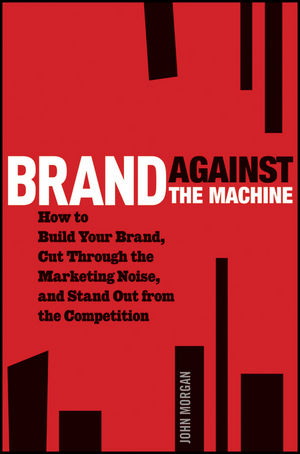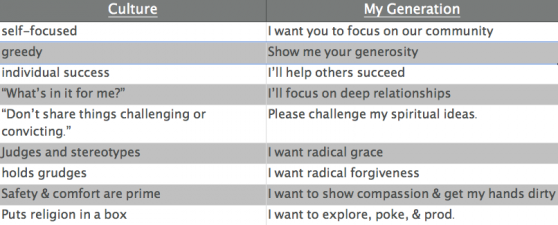I read books outside the scope of my niche. I hope you do, too.
Reading books that speak in to areas where you’re not zoned in help stretch you in new ways, applying new truths to your well-worn paths. Not everything in these books will be applicable to you. Not everything will even be relevant. But at the end of the day, truth is truth. And truth is applicable across disciplines.
Business books help me think critically about the “system” of church. About how to spur on growth and change. About how to create systems that maintain growth over time.
I recently read Brand Against the Machine by John Morgan (on Twitter, Facebook, and Blog), and found it to be full of nuggets applicable to ministry.

John talks a lot about “branding,” much outside of the context of ministry. So let me give you 3 ways to process this book.
1. Brand = your local church.
What helps your “brand” of church stand out from other “good” things a person could be doing on a Sunday morning? What is it that motivates them to consistently worship with you, instead of skipping out? YES, if someone doesn’t consistently show up for worship (or small group) it’s a spiritual growth issue. But let’s craft our message in such a way that the image (or “brand”) of our churches doesn’t get in the way of the Gospel.
John consistently makes the connection between “trust” and “sales.” If you trust a brand, you’re more likely to buy from that brand. We in churches aren’t in a completely different field. We just happen to have the best product in the world: Jesus! The more trust we develop with our congregations, the more likely we are to close a sale.*
2. Brand = the ministry you’re a part of.
What is it that helps your ministry stand out from everything else? What helps your “brand” of small groups stand out from the noises of life that distract on a weeknight, like going to a movie or watching TV? What helps your “brand” of student ministry encourage students to forego other activities in favor of linking arms with other students on Wednesday nights.
3. Brand = professional.
Feel free to read the book as it was originally intended, and think through your life in the marketplace. Process it through the lens of your company. Or even your personal “brand” online and in your community.
Giveaway contest:
I spoke with John, and he’s generously chosen to give a personally signed copy away. Just enter the contest here, and I’ll choose a winner on Friday, May 3, by 5:00 pm central time. Just fill in your information below and you’ll be officially entered. I’ll ship the book out next week.
Below each quote, I’ve included the question I’m personally wrestling with.
15 quotes from Brand Against the Machine
1. “Branding is about emotion, and emotion turns prospects into buyers.”
How am I stirring people’s emotions to help them “buy” into the idea I’m selling?
2. “People are willing to spend more money on a brand they trust. Do I want to drink a nice cold Kountry Mist or a Mountain Dew? Kountry Mist is a generic brand of Mountain Dew, and I have zero trust in that brand. Just because it’s cheaper doesn’t mean I’m gonna have a sip. Plus, it’s annoying when brands get too cute with the spelling of their name. Spelling country with a K makes me worry about their education. It isn’t kool.”
Am I developing trust and innovating? Or just stealing from pop culture?
3. “Branding is not just about being seen as better than the competition. It’s about being seen as the only solution to your audience’s problem.”
What problem in people’s lives am I helping them solve through this idea? Am I communicating that through my pitch?
4. “You are your brand.”
Am I representing the church, and the ministry I lead, well in every avenue of life in-person and online?
5. “You may have an incredible product or service, and I truly hope that you do. But having a great product or service isn’t going to be enough. If no one knows you exist, the best product in the world isn’t going to save you. It’s estimated that 1 to 5 percent of people who come in contact with your brand will become clients. Are you coming in contact with enough people?”
Am I getting my message in front of enough eyes? Am I prepared for the vast amount of people I come in contact with to say, “No” to my pitch (to lead a small group, join a small group, or take the next step of faith?)
6. “When your message is focused and directed toward a certain group of people, those people respond. They respond because they realize it’s for them. That’s the kind of attention you want. With the attention of the right people and by taking care of those people, you can start to build trust and a loyal audience. You’ll never be all things to everyone, so don’t even try.”
Who is my “target audience” and are all of our communication pushes directed towards helping them move forward in faith? Or am I trying to be “all things to everyone?”
7. “Offer prospects a better product or service than everyone else. The most important element of branding is positioning.”
How am I positioning the ministry I lead as something that’s better than what culture promises them is best for their life? I.e., why is joining a small group worth bending your life around?
8. “Branding is all about emotion. Most marketing campaigns are lacking both emotion and passion. There’s nothing for people to get attached to. In fact, people rarely if ever feel an attachment to an individual marketing campaign, but they do feel an attachment with certain brands.”
How are we “branding” small groups? Are we using emotion (stories of life change) to drive our campaigns? Do people feel an attachment with groups?
9. “Fans are very attracted to a strong stance on something.”
Is our ministry positioned as something you “can’t live without?” What is it in their lives that’s missing without the element of healthy community?
10. “No one wants your product. They want their problem solved.”
What problem are we solving in people’s lives? Are we leading our promotions with that?
11. “The better you know your customers, the better you can create valuable content and products for them. There is no point in guessing, and making assumptions about your audience is extremely dangerous.”
How am I getting to know the people I lead at an even deeper level?
12. “You are your bigest advantage in business. What you sell may not be one of a kind, but you are. You create the value for people, not your business name or fancy logo.”
Every church in town has the same Gospel message. Every small group at our church has the same end-goal in mind. What separates one from the other is our beautiful uniqueness…are we embracing that?
13. “One of the main reasons people don’t visit a new church is because they don’t know what to expect. They don’t know which doors to go in. They don’t know how to dress. People are always afraid of looking stupid. A church could ease these fears by posting a simple video on their website with a tour of the church and what to do and where to go, starting from when they pull into the parking lot. Video can take the unknown element out of the equation for prospects.”
Are we overcoming fears through how we promote small group life?
14. “Price often gets the blame when a product fails. Although price could certainly be the culprit, most of the time it is not. The problem is that consumers failed to see the value in it. When selling your product or service, focus on value, not price.”
Are we selling the value of small groups well? So that people understand that the price (giving up a night of the week, finding childcare, forming new relationships) is worth the value?
15. “Your fans want to be a part of something that is fun, exciting, and has a real sense of community.”
Are we having fun? Or just doing a job?
The book is full of even more nuggets, but this blog post is already too long. Honestly, if you’ve made it this far, I’m impressed. 🙂
You can pick up a copy of the book for yourself HERE.
*In no way am I discounting the work of the Holy Spirit to awaken the heart. I just want to posture myself, and our ministry, to be most ready for His work.







